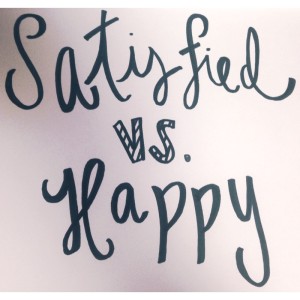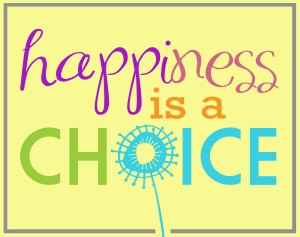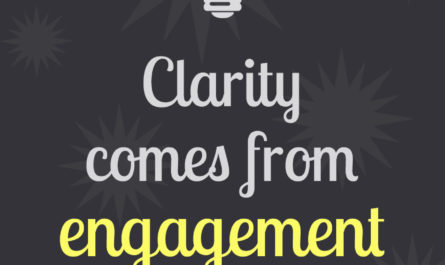 The cultural Knower/Judger rule, at least here in the Western world, is that we continually strive to close the gap between what we have or are, and what we want or want to be. The desire to close this gap is a motivator. It’s what will help you make a higher salary or annual income this year, hit your sales goals, and get the car, house, or clothes you want. But let’s face it. The driving force of the American Dream is a certain level of dissatisfaction and, quite naturally, unhappiness—until you get what you want. My question is this: do dissatisfaction and unhappiness have to go together?
The cultural Knower/Judger rule, at least here in the Western world, is that we continually strive to close the gap between what we have or are, and what we want or want to be. The desire to close this gap is a motivator. It’s what will help you make a higher salary or annual income this year, hit your sales goals, and get the car, house, or clothes you want. But let’s face it. The driving force of the American Dream is a certain level of dissatisfaction and, quite naturally, unhappiness—until you get what you want. My question is this: do dissatisfaction and unhappiness have to go together?
What is satisfaction?
An online dictionary defines it as “fulfillment of one’s wishes, expectations, or needs.” There’s that word…expectation.
Whenever I expressed frustration about something to my old mentor, Jut Meininger (author of How to Run Your Own Life), he implored me to let go of my expectations. “Expectations,” he taught, “are the basis of all frustrations. Give up the expectations and frustration evaporates.”
If I have no expectations, then it follows that I am totally satisfied with my situation (or the environment around me).
My challenge comes when I bind my level of satisfaction with my happiness.
Satisfaction is a metric. I can be satisfied when my expectations are met. I can be mildly dissatisfied when reality doesn’t quite match my expectations. And I can be totally bummed when I don’t have a clue how to get from point A to point B and it doesn’t appear that I ever will. I think we’ve all experienced these levels of frustration.
How we handle these, I believe, is greatly dependent on the entirely disassociated emotion of happiness.
What? Happiness isn’t synonymous with satisfaction?
Actually, I think we’ve been taught that throughout our lives. I hit that putt and yippee! I’m happy! I miss it…and I’m pissed. Clearly I understand the connection. That same online dictionary lists satisfaction as a synonym for happiness. It’s a cultural K/J rule.
For a moment, let’s exercise some healthy doubt about that rule.
What if happiness is not related to satisfaction?
Well, for one thing, I probably wouldn’t be on my fourth putter in three golf seasons.
I am frequently disappointed by missing five- and six-foot putts. And my reaction sometimes goes way beyond my level of dissatisfaction and begins to contribute to a growing state of unhappiness…because that’s what I’ve been taught.
Let’s face it…given the choice between being happy and being unhappy, I think we’d choose happy, right? The K/J rule doesn’t allow me to do that when my satisfaction is low.
So what’s a body to do?
If I decide that my general happiness is too important for such trivial things as a spike mark altering that par putt to affect it—if I choose to disassociate happiness from my state of satisfaction—I can convert my unmet expectation into a lesson.
Notice the important words in that statement? Decide? Choose?
This rule about tying happiness to satisfaction can be rewritten. If I decide it’s not serving me well and I choose to change it.
I read recently that science has disproven the K/J rule “Happy people live longer.” It seems you can be a complete curmudgeon your whole life and live just as long as a happy person. But given the choice of a curmudgeon’s life or a happy life, which would you choose? There’s that word again…choose.
The point I’m making here is that we have and always have had the ability to rewrite K/J rules that don’t work for us. Choosing to be happy when things aren’t meeting my expectations has probably enhanced my life experience more than anything else. I fall off the wagon every once in a while (ask my golf partners), but not for long.
I see satisfaction as a metric. It measures a fact—my expectation was met or it wasn’t. I won the lottery or I didn’t…sunk the putt…well…you get it. I can’t change the facts associated with an outcome.
I see happiness as a state of mind. I operate better in my day-to-day world when I’m happy than when I’m not happy. And I’ve discovered I can choose that.
Powerful. What choice are you making today?



